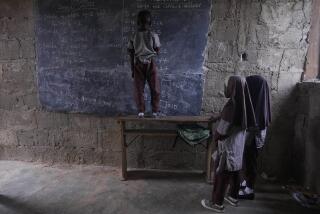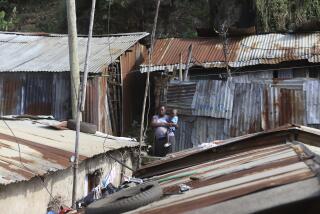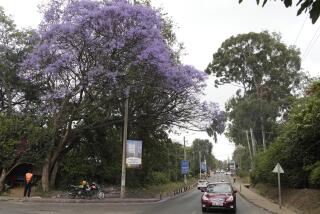No Shortage of Humor in Parched Kenya
- Share via
NAIROBI, Kenya — A popular joke circulating in this capital city these days goes like this:
Question: “What is the difference between the country of Kenya and the Titanic?”
Answer: “The Titanic went down with its lights on, and there was plenty of water around.”
As they suffer under stringent power and water rationing, many residents of a country famed for its spectacular wildlife and scenery are angry that the nation seems to be sinking into a black hole. But they are finding creative ways to survive and are still trying to look on the bright side.
Jokes abound about this East African country giving credence to the term “Dark Continent,” Nairobi’s new fashion “trend” of being unkempt, and the latest unwashed “fragrance” many city residents seem to be sporting. It is an attempt to laugh off the impact of lengthy power outages and rationing that leaves homes without any water three to five days a week.
The shortages are blamed on Kenya’s worst drought in recent history, which has led to a massive drop in water levels at hydroelectric dams and reservoirs. Drought has hit the entire country, but it is particularly severe in the northwest and northeast, plunging the nation into a food crisis and putting about 3.3 million Kenyans in need of food aid.
The energy crisis is expected to drag on until at least the end of the year, when the next rainy season normally would start. Sociologists and psychiatrists say humor is likely to give way to stress and depression--and the symptoms are already beginning to show as people adopt extreme measures of conservation.
“It’s very stressful because it’s a new experience of urban life,” said Frank Njenga, a respected local psychiatrist and social commentator. “There are various things that one takes for granted when living an urban life, like flushing the toilet, taking a shower, doing laundry. [Rationing] is a completely different lifestyle for urbanites, certainly of the middle class.”
Opposition politicians blame the crisis on the government. They argue that it is a direct result of corruption in the energy sector, and a lack of proper planning.
President Daniel Arap Moi argues that the drought is to blame, and that he is no rainmaker. His administration has promised to put in place urgent measures to increase power generation, including importing new equipment. Neighboring Uganda has agreed to increase its exports of hydroelectric power.
U.N. Food Program Seeks Donations
A lack of significant rainfall since mid-1998 has led to crop failure and the wide-scale death of livestock, forcing the Kenyan government and international humanitarian organizations to appeal for food aid. The U.N. World Food Program is seeking donations of $88 million to feed the nation’s needy through the end of the year.
Those with sufficient food still must grapple with the dearth of electricity and water. Under the water-rationing program, the City Council has divided Nairobi into four zones, which are meant to receive water on different days of the week. Supplies will eventually be cut in all areas on Sundays to build up water levels in the reservoirs.
Improvisation has become the name of the game.
“I make a mental note to keep the water I use for bathing and use it either for flushing the toilet or mopping the floor,” said Penny Kimani, 31, an accountant who hasn’t had water at her residence for the past two months. “I try to recycle all the water I use. I also try to balance between conserving water and hygiene.”
Andrea Moraa Mogaka, 32, a marketing manager for a prestigious travel and tour company, alternates between bucket baths and taking a “dry bath” using a damp cloth. Forced to rise at dawn to collect water for her laundry, Mogaka recycles it to clean the floors or flush the toilet.
“I’m beginning to appreciate the way many other people [normally] live,” said Mogaka, who knows of neighbors who fetch water from a polluted local river to do their chores. “It’s God’s way of showing the privileged what they have.”
Pamela Odwouri, 24, walks almost two miles each morning to take her place among scores of others in a queue near the grounds of an upscale jockey club. The management has allowed the needy to collect water from one of the outdoor taps near the racetrack between 5 a.m. and noon. People with plastic jugs and buckets jostle for position.
“The little water I get, I try to spare it, because you never know about tomorrow,” said Odwouri, a mother of two who makes the trek to the water line at least three times a day to fill seven canisters. She stands in line for up to two hours.
A Flare-Up in Sales of Lanterns
Electricity typically goes out between 6:30 a.m. and 6:30 p.m., or between noon and 11 p.m. each day. Residents have begun using candles, lanterns, gas stoves and charcoal burners. There has been a rush on homemade lamps crafted from tin cans with a few drops of paraffin on the bottom, a wax-covered wick curling up from within. The can is perforated to allow the light to shine through.
Mary Mweni, who makes such lamps, says business is booming. It’s more economical to buy one tin lamp than several candles that quickly burn out, says Mweni, whose lantern sales have shot from 20 to 50 a day.
But one man’s fortune is another’s demise. Local media report that there has been a marked increase in fires and accidents stemming from the use of lamps and candles.
Sheila Chimwani, 28, says she has no choice but to sleep with her lamp lighted at her bedside because her 3-month-old baby daughter demands constant attention. Using a lantern is easier than groping around in the dark for candle and matches, Chimwani says.
Power shortages also have cut into the ability of children to do their homework in the evenings, and of teachers to read and mark lessons.
There have been reports of deaths at some hospitals outside Nairobi due to power being shut off to life-support and monitoring machines, incubators, operating-theater equipment, and storage areas for vaccines, blood supplies and specimens. Last month, the Kenya Medical Assn. demanded an end to the rationing at medical institutions, prompting the health minister to promise that all major public hospitals would be exempt.
For medical lab technician Charles Simiyu Nangulu, lack of water has meant that when he needs a specimen from a patient, he has to send the person to the bathroom of a neighboring restaurant that may have water.
Much local industry and commerce have been crippled by the shortages, leading to layoffs and an increase in crime as people become desperate.
One reputable security outfit reported a rush to hire patrolmen with trained guard dogs to replace regular night watchmen, who are unarmed and prone to fall asleep on duty, sometimes even before it gets dark.
Security guards from the Masai ethnic group, known for their vigilance, loyalty and abilities with hippo-hide whips and bows and arrows, are said to be in great demand.
The shortages have also sparked violent outbursts such as that at a local teachers college, where students stormed the campus kitchen, broke dining hall utensils and ate food meant for guests in protest of the lack of water and electricity. Carwash attendants have fought running battles with city security guards trying to shut off their illegal water connections.
Still, Kenyans, who sometimes seem overly tolerant, generally accept it all--even the fact that their monthly electricity bills haven’t gone down despite the rationing. And they look for humor to help get them through.
Kenyan women joke that finally their husbands and partners have been forced to sit down with them to candlelight dinners. In the absence of television and radio, men laugh about having again “noticed” their wives, and sociologists predict a rise in the number of pregnancies this year. In general, people are talking more to each other.
“The only silver lining to this dark cloud is [that] the art of conversation is coming back,” said Njenga, the psychiatrist. “I know a number of families who are rediscovering each other.”
*
Samuel Hinga Mwangi and Bertha Omany-Odeny of The Times’ Nairobi Bureau contributed to this report.
More to Read
Sign up for Essential California
The most important California stories and recommendations in your inbox every morning.
You may occasionally receive promotional content from the Los Angeles Times.














